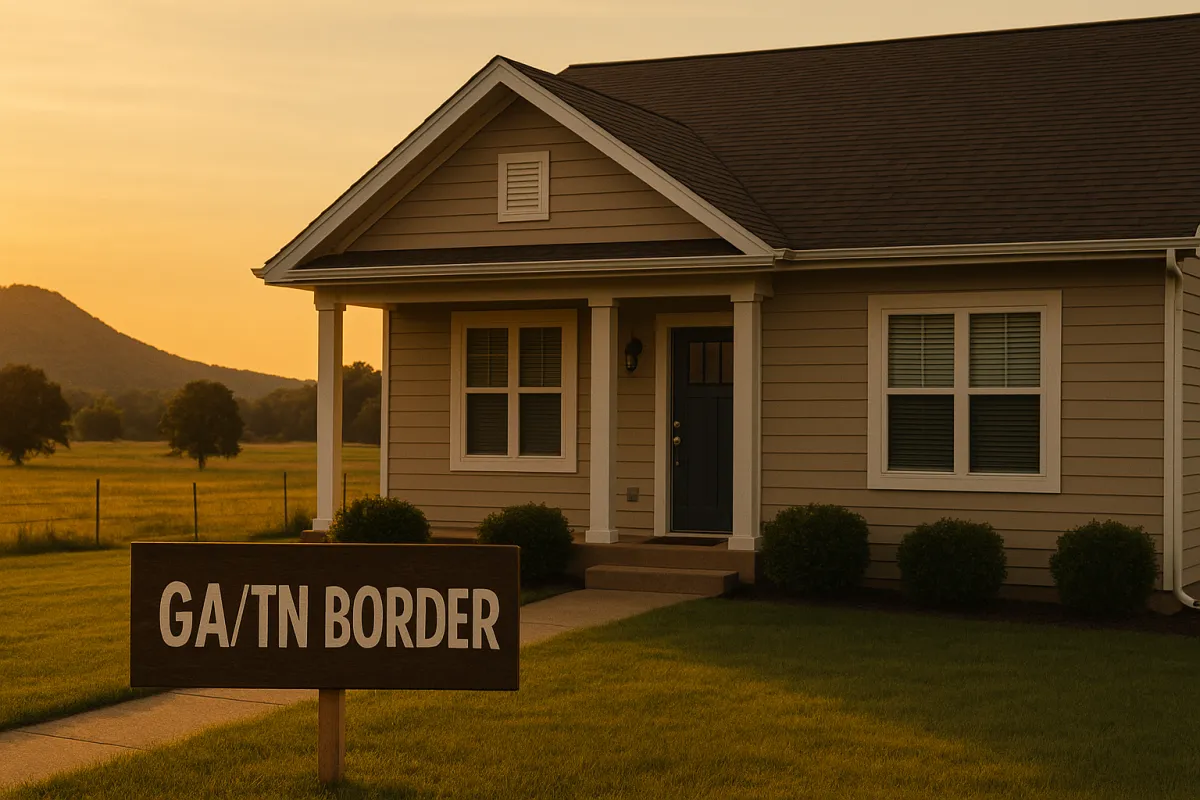
Buying Near the GA/TN Border: What Homebuyers Need to Know
Buying a Home Near State Lines: Unique Considerations When Living on the GA/TN Border
A 2025 Homebuyer’s Guide from Hanson Capital Homes
Introduction: One Foot in Georgia, One in Tennessee—What Could Go Wrong?
Imagine waking up in Georgia, working in Tennessee, shopping in Georgia, and paying taxes in... well, both.
That’s the reality (and beauty) of living near the Georgia-Tennessee state line, especially in places like Chattanooga Valley, Rossville, Lookout Mountain, and East Ridge.
Buying a home on or near a state border comes with some awesome perks—like short commutes and affordable housing—but also some unique surprises that buyers should understand before signing on the dotted line.
At Hanson Capital Homes, we help buyers navigate the quirks of border living every day. From taxes and school districts to insurance and utilities, here’s what you need to know before buying a home on the GA/TN border in 2025.
Why People Love Living Near the GA/TN Line
Affordability: Georgia homes often come with lower property taxes and purchase prices compared to similar homes in Tennessee
Proximity to Chattanooga: Many Georgia-side communities are just 15–20 minutes from downtown Chattanooga
Lifestyle options: Quiet, rural settings in GA with easy access to urban amenities in TN
Low cost of living: Overall expenses (insurance, taxes, groceries, gas) are often lower in Georgia
💡 Did You Know? Many buyers choose Georgia addresses for the tax savings, then work or shop in Chattanooga for convenience.
1. Property Taxes: Georgia vs. Tennessee
State Property Taxes Sales Tax State Income Tax
Georgia Lower 4–8% Yes (Avg. 0.83%) (county dependent)
Tennessee Higher 9.25% avg No state income tax (Avg. 0.71–0.85%)
What This Means for You:
Georgia offers homestead exemptions that lower property taxes further
Tennessee has no state income tax, which can benefit higher earners
If you work in one state and live in another, you may have to file in both
🧾 Pro Tip: Talk to your tax advisor before choosing sides—especially if you're self-employed or own rental property.
2. School Districts & Zoning
One side of the street might be Walker County, GA, while the other is Hamilton County, TN—and school zones don’t cross over.
School Considerations:
Georgia: Public schools like Chattanooga Valley Elementary, Ridgeland High School
Tennessee: Zoned for schools in Lookout Valley or East Ridge
Private or Charter Options: Available on both sides, but residency requirements may apply
🎓 Ask us for the zoning map and school ratings for any home you’re considering—we’ll make sure you know the options.
3. Home Insurance Differences
Because Georgia and Tennessee have different laws, weather patterns, and insurance markets, your rates may vary dramatically—even just one mile apart.
Factors That Affect Premiums:
Flood zone status (especially near creeks or low-lying areas)
Local weather history (hailstorms are more common in parts of TN)
Older homes (GA has more pre-1970s homes in border towns)
💡 Pro Tip: Always get a real quote before you buy—don’t assume based on zip code alone.
4. Utilities, Trash Pickup & Internet
Each state—and sometimes each county or city—has its own utility providers, rules, and rates.
Georgia Homes (Walker & Dade County):
Electric: Georgia Power, North Georgia EMC
Water/Sewer: Local utilities or well/septic
Internet: Often Windstream, Comcast, or rural providers
Trash: Usually private providers or city contracts
Tennessee Homes (Hamilton County):
Electric: EPB or TVA
Water: Tennessee American Water
Internet: EPB Fiber (popular for its speed!)
Trash: Often included with city services
📶 Want blazing-fast fiber internet? Some areas in TN may have an edge—but GA is catching up.
5. Commuting & State Lines: No Passport Needed
The best part? The state line is invisible in daily life. Most buyers who live in Georgia and work in Tennessee commute less than 25 minutes, often without traffic.
Popular Commutes:
Ringgold, GA → Downtown Chattanooga, TN: ~20 mins
Flintstone, GA → East Ridge, TN: ~10 mins
Trenton, GA → Lookout Mountain, TN: ~15–25 mins
🚙 Bonus: Georgia car tags are cheaper—but Tennessee’s roads get more funding. It’s all about trade-offs.
Featured Snippet: Living on the GA/TN State Line—What to Know
Top Considerations When Buying a Home Near the Georgia-Tennessee Border:
Property tax vs. income tax differences
School district zoning and eligibility
Insurance premiums and flood zones
Utility and service providers vary by city/county
Commuting across state lines is simple—but tax filing may be more complex
HOA or No HOA? It May Depend on Which Side You're On
Georgia subdivisions tend to have fewer HOAs, or more relaxed rules
Tennessee communities (especially new builds) often come with structured HOAs, amenities, and rules
